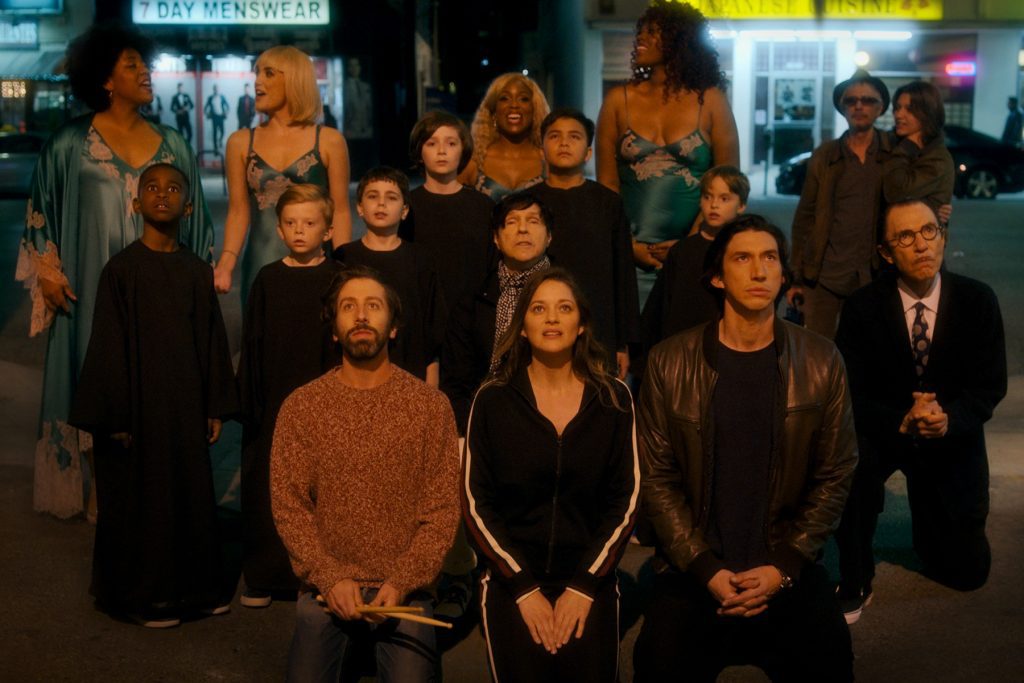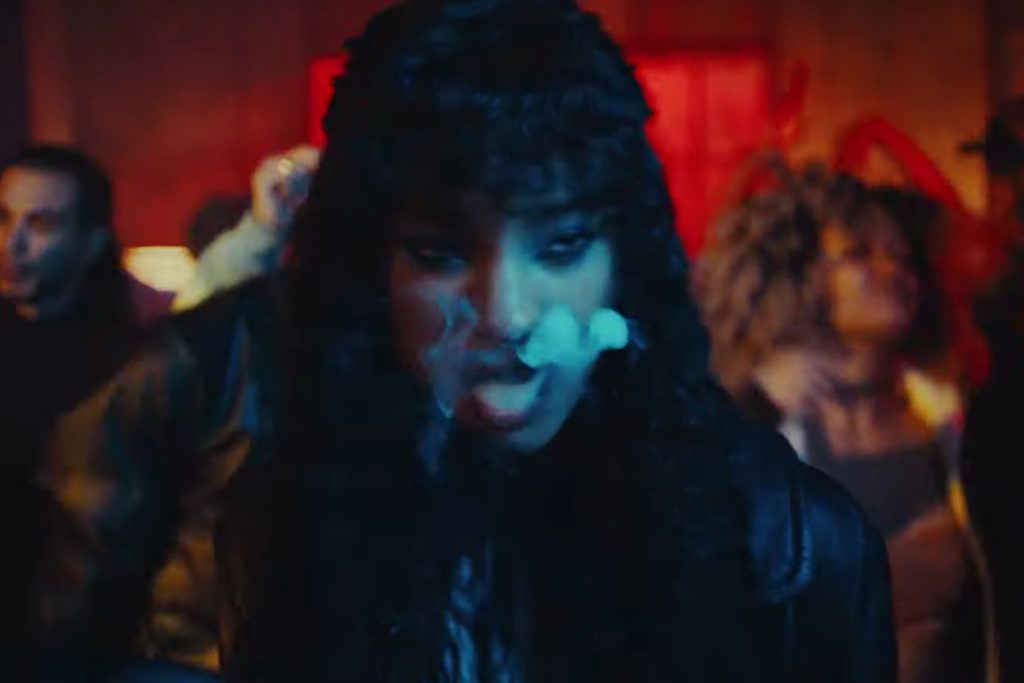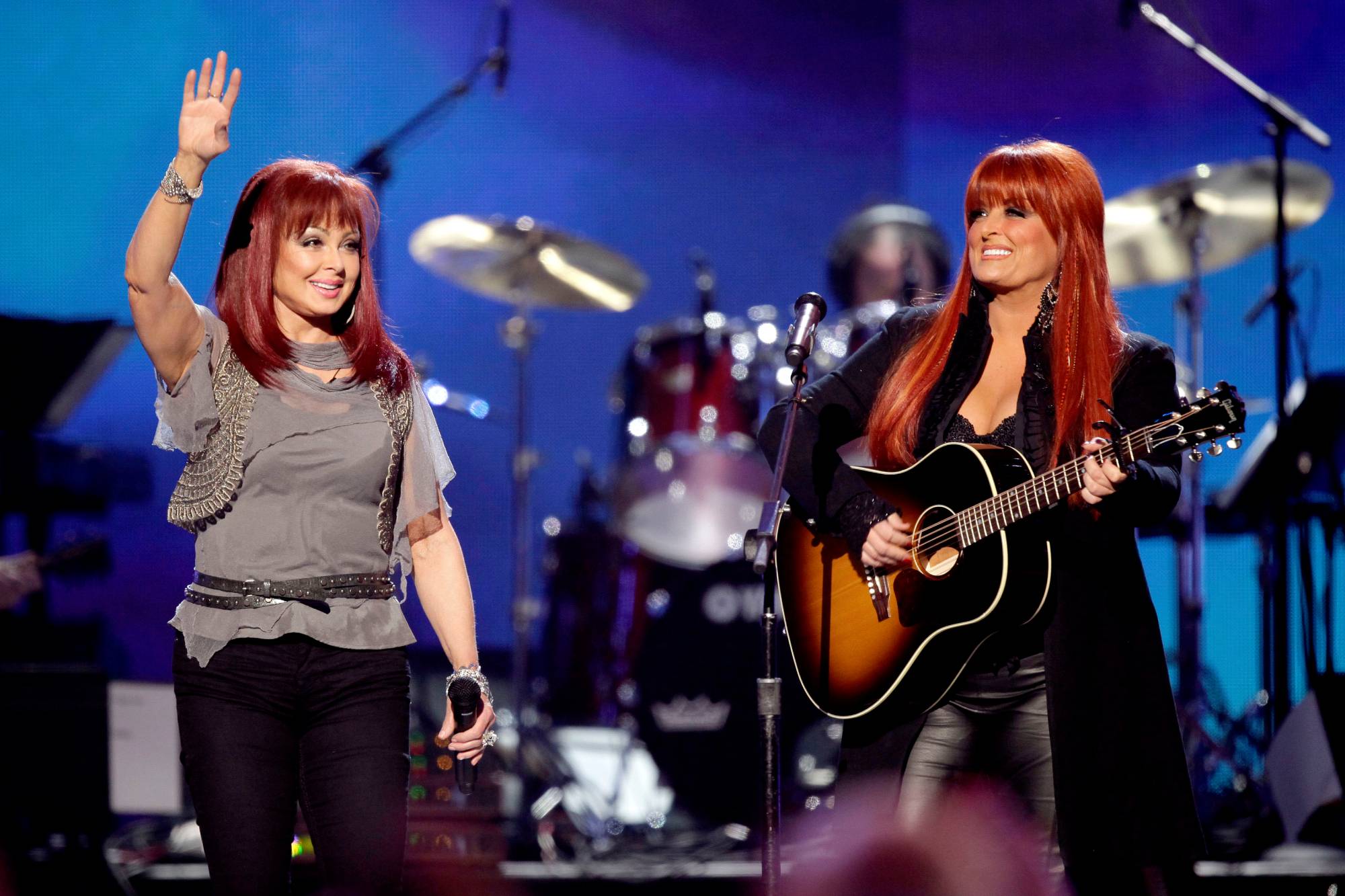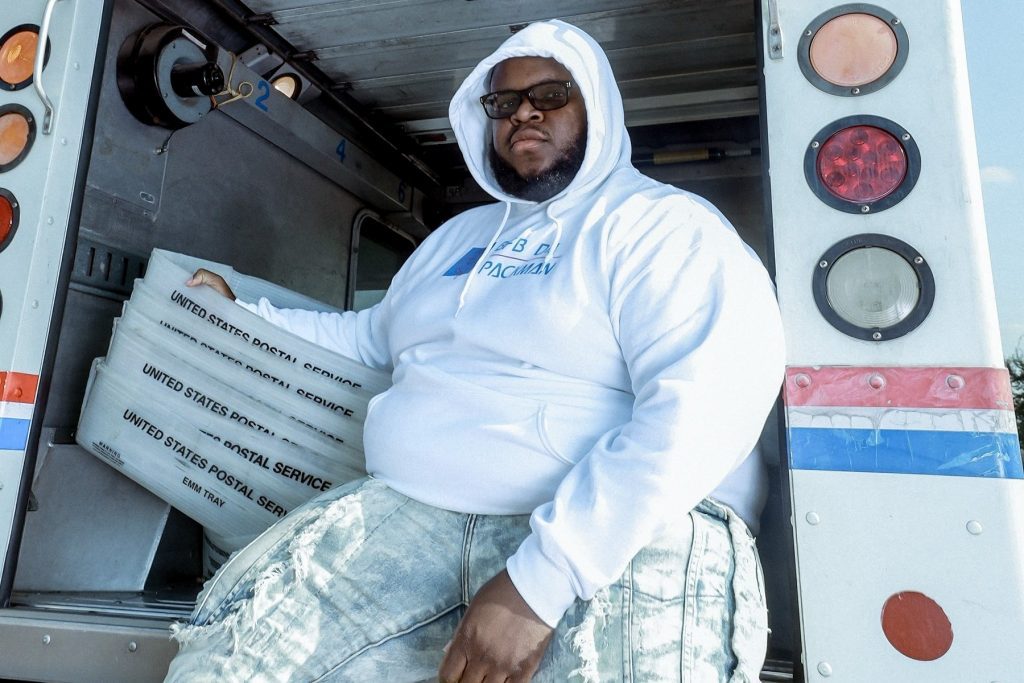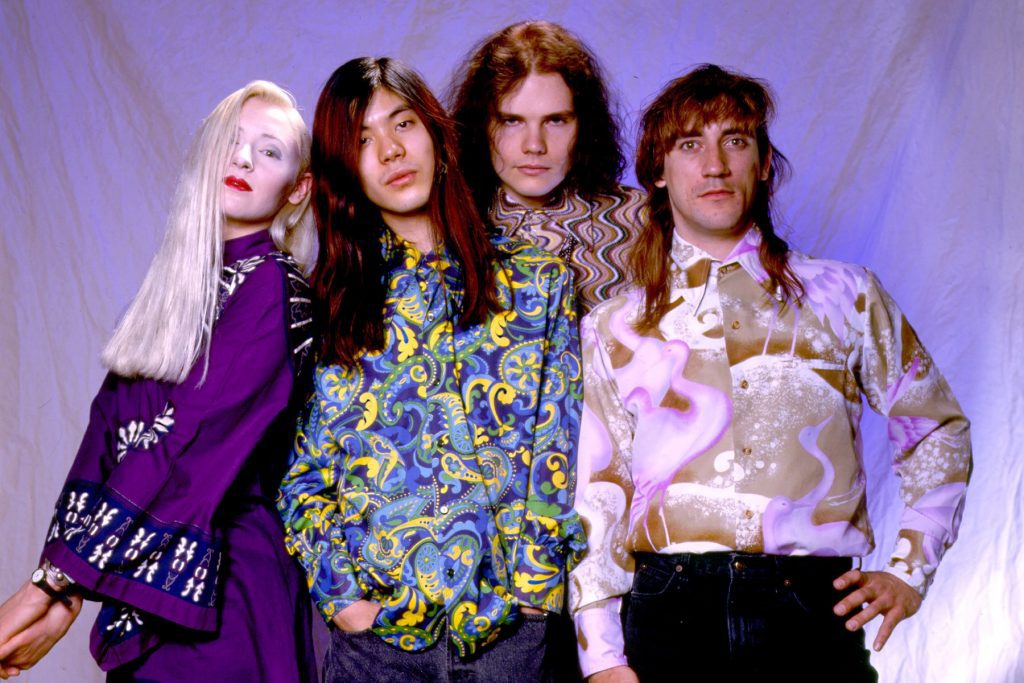
Billy Corgan Reflects on the 30th Anniversary of ‘Gish’ and Looks Ahead
Before Nevermind, Ten, Badmotorfinger, or Dirt, there was Gish. And while it may be a stretch to say that Smashing Pumpkins’ 1991 debut LP was the first album of the alternative rock revolution (Jane’s Addiction, Pixies, Nirvana, and Mudhoney might have something to say about that), it was an enormous landmark nonetheless. At a time when most indie albums failed to reach many fans outside of an act’s small cult, Gish entered the Billboard 200, topped the CMJ chart, and connected in territories as far away as New Zealand and Australia.
Perhaps because the MTV crowd didn’t become aware of the Pumpkins until Siamese Dream hit in 1993, long after Nirvana and Pearl Jam broke out on the cable channel, Gish‘s impact has been somewhat obscured. Few realize it was the best-selling indie record in rock history until the Offspring outdid it in 1994 with Smash.
With Gish turning 30, the band is celebrating on Saturday with a two-hour livestream where Billy Corgan and Jimmy Chamberlin will take questions, spin Gish-era classics, and preview unreleased music. Fans can tune in for $19.91 (get it?) and portions of the money raised will be donated to PAWS, a no-kill animal shelter in Chicago.
blogherads.adq.push(function () {
blogherads
.defineSlot( ‘medrec’, ‘gpt-dsk-tab-article-inbody1-uid0’ )
.setTargeting( ‘pos’, [“mid-article”,”mid”,”in-article1″,”mid-article1″] )
.setSubAdUnitPath(“music//article//inbody1”)
.addSize([[300,250],[620,350],[2,2],[3,3],[2,4],[4,2]])
;
});
A couple of days before the big anniversary, we spoke with Corgan about how the band created Gish at producer Butch Vig’s Smart Studios in Madison, Wisconsin; the impact that LSD had on the music; and the album’s long legacy. We also touched on the Pumpkins’ 2020 album, Cyr, and the band’s future plans, which include a Mellon Collie and the Infinite Sadness sequel album and a return to the road after a two-year hiatus.
It’s 8:30 a.m. where you are. I’m surprised you wanted to do this so early. Are you a morning person?
I was up at 5:30 this morning.
Wow. Why?
I’m actually writing wrestling shows. We have a pay-per-view coming up, and we have 10 other episodes coming. I was writing for them until just now.
I want to start on Gish, since this is the 30th anniversary. How does it feel to think it was 30 years ago this week that the album came out?
It’s pretty wild, because it doesn’t seem that long ago. I remember my grandmother telling me stories about things that happened and her saying, “Gosh, it doesn’t feel like that long ago.” To me as a kid, 30 years seemed like a lifetime.
And now I look back, and it doesn’t feel that long ago. I can still see us in Smart with Butch. I can still see where the drums were and everything. It’s as clear in my mind as if it happened a year ago. It’s pretty wild. I know it’s real, but I’m a little slow on accepting it.
I often see Gish described as this little indie album that set the stage for Siamese Dream. In reality, it was a huge success. Do you think because the songs weren’t on MTV and Nevermind and Ten hit just a few months later, that its success has been somewhat memory-holed?
Not only did it get memory-holed, but people have tended to diminish the influence of the record. I remember having a conversation with Eddie Vedder when we were on tour with the Red Hot Chili Peppers [in late 1991]. He told me how much of an influence Gish was on their first record. And through the years, I’ve talked to many, many people who really pointed to Gish as the game-changer in their mind about how to approach guitar and how to record.
Obviously, the album had a lot to do with how Nevermind was recorded. The album had a lot to do with what became Queens of the Stone Age. I remember Josh Homme talking to me about Kyuss, the band he was in before Queens, and how Gish was the record for him that really turned his head.
So privately, I’ve had a lot of conversations over the years of people talking to me about Gish. But it’s been kind of pushed aside because, obviously, what followed it was so massive and so game-changing that it got a little pushed back. And then Siamese Dream seemed like our breakthrough moment.
blogherads.adq.push(function () {
blogherads
.defineSlot( ‘medrec’, ‘gpt-dsk-tab-article-inbody2-uid1’ )
.setTargeting( ‘pos’, [“mid-article2″,”mid”,”in-article2″,”mid-article”] )
.setSubAdUnitPath(“music//article//inbody2”)
.addSize([[300,250],[300,251],[620,350],[2,4],[4,2],[3,3]])
;
});
But to your point about it being successful, it was hugely successful. In fact, it was so successful that our parent company, which was Virgin Records at the time, wanted to re-release the record on Virgin. They wanted to take advantage of what was happening with the other bands.
You cut this record when the biggest rock bands were groups like Warrant and Poison. Did you even think it was possible for the album to find a big audience in that landscape?
I think our focus was very much the world that we were in. If you could sell out a club like the Metro in Chicago, which was 1,000 people, you were doing something. That’s where we were going to see My Bloody Valentine and whoever else we were into at the time. It was bands that I really like that have been swept aside a bit by history, bands like Loop and Screaming Blue Messiahs. There were a lot of bands that were in the churn at the time that were quite good, kind of shoegazy bands, like Cocteau Twins and Clan of Xymox.
The aspiration then was that if you were big, you got to play the Metro. And if you were really big, you got to play the Riviera Theater, which was 2,500 or something. That was it. That was your ecosystem.
Butch Vig was obviously a very important part of this album. From your perspective, what were his most important contributions?
Well, the first thing is that Butch, as a drummer, really connected with Jimmy Chamberlin, and not just on his drumming, but also on his drum sound. They had a natural affinity, and they spoke that language that only drummers can speak. Butch was a very early…acolyte? I don’t know what the right word is. He was the first true believer in Jimmy’s ability. He got it. Butch was recording indie drummers all the time, and here comes Jimmy Chamberlin at the door. He was like, “This guy!”
The way that Jimmy hit the drums connected with the way that Butch recorded drums. To me, when I think of Gish, I think of the drum sound.
I know he pushed you hard as a vocalist and made you sing parts over and over and over. I imagine that in hindsight, you recognize he was just trying to get the very best out of you. It must have been frustrating at the time.
Well, there’s a twin message there. One is that Butch would talk vociferously about the experiences that he had in the music business, about being tortured by producers. I won’t name names, but he felt very burned by his experiences in bands that were signed to major labels. And then he’d turn around and ask the same things of me. I thought, “Well, this is a very strange message to send.”
Now, of course, in the post-Pro Tools era, I understand what Butch was trying to do was achieve a level of consistency that can only be ascertained through really hard work. But at the time, it was so far outside my range of experience that I took it as, “Well, if I have to sing this thing 40 times, I must not be very good.”
blogherads.adq.push(function () {
blogherads
.defineSlot( ‘medrec’, ‘gpt-dsk-tab-inbodyX-uid2’ )
.setTargeting( ‘pos’, [“mid”,”mid-articleX”,”in-articleX”,”mid-article”] )
.setSubAdUnitPath(“music//article//inbodyX”)
.addSize([[300,250],[300,251],[3,3],[620,350]])
.setLazyLoadMultiplier(2)
;
});
This was your first album and you were very young. I imagine a lot of the process was outside your comfort zone.
Yeah. Butch’s stress points were being in tune, both musically and with the vocals, and being in time at a very, very high level. I’d never played to that level, nor had Jimmy. He showed us through making the record how the concussive nature of the band could come through with precision. That set us down this particular trajectory. Once we were able to do it, he just wanted more. It was one of those things where it became like a drug. He kept raising the bar and we kept meeting him at the bar and he kept raising the bar again.
That’s the mark of a good producer.
Yeah. People can wax nostalgic about this particular period in time. I was in the studio with a guy who was basically an unknown, as were we. I mean, he was doing some Sub Pop stuff. We knew that he’d worked some with Nirvana, and Nirvana was obviously on the rise. There was a thing happening, but people didn’t know who he was.
I remember having a record company meeting and the guy said…I think it was Donnie Ienner, who was running Sony at the time. He asked me who I wanted to produce our first album. This is before we signed with anybody. I said “Butch Vig,” and he said, “Who? What’s a Vig?”
You gotta remember that we were in the studio the day that he got the call to do Nevermind. I was literally in the next room. I could hear him talking. He came in and said, “I’ve been offered this job.” He had this glum look on his face because they wanted him to work with someone he didn’t necessarily want to work with. They didn’t trust him because he wasn’t a known entity. Even though Kurt wanted to work with him, the label was suspicious of that and wanted him to work with a more established name producer, basically sublimating him in the process. And obviously that ended up not happening, and Butch produced the record himself, and even then they took the mix away from him, which is why Andy Wallace did it.
We were there as all these things were happening not only for us, but for the scene in general, and then Butch by extension. It’s one thing to look back at history and go, “Oh, how fantastic.” But at the time, it was very insecure. None of us were guaranteed anything.
I would guess that the major labels couldn’t comprehend that this kind of music could find a large audience. It must have feel so niche to them, and they wanted to change it to something they thought would sell.
You’d didn’t have to guess at that. They told you that. You would sit in the meetings and they’d tell you, “This stuff will not sell.” I’m kind of paraphrasing the general quote, but it was like, “We know that something is happening and we want to be in that business, but we don’t think it’s going to be as big as it could be, so what are you willing to do do make it bigger?” All of us would shrug our shoulders and go, “We don’t know what you’re talking about.”
blogherads.adq.push(function () {
blogherads
.defineSlot( ‘medrec’, ‘gpt-dsk-tab-inbodyX-uid3’ )
.setTargeting( ‘pos’, [“mid”,”mid-articleX”,”in-articleX”,”mid-article”] )
.setSubAdUnitPath(“music//article//inbodyX”)
.addSize([[300,250],[300,251],[3,3],[620,350]])
.setLazyLoadMultiplier(2)
;
});
It’s not like you were going to write a “Cherry Pie” or something. You did what you did.
They would float everything from, “Are you willing to work with outside writers?” They would float names that would obviously just kill your cred out the door. You can see where the bending started to happen. “OK, I guess we’ll let you work with a Butch Vig, Kurt, if that’s what you really, really want. OK.”
There was a lot of this kind of eye-rolling. It was like, “What is this? Why do we have to… Why can’t we just plug this into the system that exists with the name names and the name people?”
It’s easier to use the Nevermind situation to illustrate the point. Kurt tells the label he wants Butch Vig. They try and stick him with somebody else. That doesn’t happen. Butch makes the record. Butch mixes the record. And they take the mix away from Butch and give it to Andy Wallace because he’s a name guy. If you remember, Kurt famously said he picked Andy Wallace because he’d done Slayer.
The point is that we were all sneaking in through the side door, so to speak. The labels severely underestimated the power of what was coming. And to take it back to our situation, we were signed to Virgin, but they didn’t want what became Gish to come out on Virgin.
They gave us a very modest budget and wanted us to get our feet wet, so they were stuck us in the corner with this no-name producer named Butch Vig to make a record that, in their mind, was going to fly under the radar. They were positioning us for where they felt we could go later. Our record starts selling like crazy and they start thinking, “Maybe we’re onto something.” Around the time they’re trying to figure out what to do, here comes Nevermind and here comes the Pearl Jam record. And the game is instantly changed overnight.
blogherads.adq.push(function () {
blogherads
.defineSlot( ‘medrec’, ‘gpt-dsk-tab-inbodyX-uid4’ )
.setTargeting( ‘pos’, [“mid”,”mid-articleX”,”in-articleX”,”mid-article”] )
.setSubAdUnitPath(“music//article//inbodyX”)
.addSize([[300,250],[300,251],[3,3],[620,350]])
.setLazyLoadMultiplier(2)
;
});
I want to talk about some Gish songs here. You’ve talked about “Rhinoceros” as a real turning point for you as a writer. Can you elaborate on that?
I think for us, it was trying to find the balance between the sensuality and grace of the kind of shoegazer stuff that we were really into, whether it was the Cure, Siouxsie and the Banshees, or My Bloody Valentine, against what we were interested in — what we’d term “classic rock,” but was not being called “grunge.”
That was the one thing that a lot of the indie writers had a lot of trouble with circa 1990, me name-checking Black Sabbath and Led Zeppelin. Even the way that Soundgarden was received, it was sort of a piss-take on heavy riffing. They were doing it, but it wasn’t as serious or as dumb. Chris Cornell even wrote songs as if they were winking at dumb ideas. It was a meta-riff on, “Yeah, we’re playing in this dumb sandbox.”
For us, it was trying to become this balance point between what felt like dumb riff rock and then the stuff we were really attracted to coming out of the U.K. And then we put those pieces together with the Beatles somewhere in the middle. A song like “Rhinoceros” found that balance for us where we could be beautiful, pretty, psychedelic, and then flip the switch and be heavy and play a ripping lead.
At the time, a lot of people were like, “What the fuck are you guys doing?” They just couldn’t understand it because you weren’t supposed to put these pieces together. They didn’t go together aesthetically in their mind. They certainly didn’t go together commercially.
The riff on “Siva” feels like an important moment also.
That was, for me, the first time I thought, “OK, I can really do this.” By “do this,” I mean really put those ideas into one song. It was heavy, but it felt sensual. It was the same feeling I’d get when I took LSD and listened to Indian music. There was a certain kind of music in the pulling of the strings. I don’t know how to articulate it other than it came through that. It was this want for a psychedelic feeling, albeit played at 11. It took us a while to figure that all out.
Even when grunge as a genre started taking off, we were treated as outsiders since our approach wasn’t as obvious as most people’s was when it came to rock. When you look at some of the great moments in early grunge history, you get the sense that the bands are winking past the graveyard. They’re like, “We know we’re playing this kind of rock, but we aren’t taking it too seriously and neither should you.” We took it a lot more seriously and we got a lot of shit for that.
On a song like “Daydream,” I hear the influence of My Bloody Valentine, but you put your own spin on it.
Yeah. That’s a funny story. We become friends with the Valentines. One time, Kevin Shields was on a tour bus somewhere. He said, “I really like that song ‘Daydream.’” I said, “You should, because I got it from you.” [Laughs.]
blogherads.adq.push(function () {
blogherads
.defineSlot( ‘medrec’, ‘gpt-dsk-tab-inbodyX-uid5’ )
.setTargeting( ‘pos’, [“mid”,”mid-articleX”,”in-articleX”,”mid-article”] )
.setSubAdUnitPath(“music//article//inbodyX”)
.addSize([[300,250],[300,251],[3,3],[620,350]])
.setLazyLoadMultiplier(2)
;
});
Even the way we approached the singing… It was such a beautiful time. You felt free to just bounce about and find things you found interesting and throw them into the mixture of the band. What’s interesting, and what I like to say about Gish, is it shows our influences and it shows who we were as people before the real pressure came in. Siamese Dream is the representation of when the pressure came in. It was like, “OK, now we need to really figure out who we are.”
We were in this incredibly crowded place all of a sudden. Before, we were working at Butch’s. There’s no pressure. We go across the street for a grilled cheese sandwich. There’s no Internet. There’s literally nothing. It’s just us and the Gulf War on TV. It was so simple and the scene was very small. I loved that we were able to capture who we were as people before that crazy rocket ride started. Obviously, it changed us and nothing was ever the same after that.
If you hadn’t been experimenting with LSD during this time, do you think Gish would have been a different record? Did it open your mind to new ideas?
Kind of yes and no. I was a big psych listener. I’d listen to psychedelic records I’d find at thrift stores. I turned James [Iha] onto a lot of stuff, like the Lemon Pipers. We used to sit in my bedroom and listen to The Lovin’ Spoonful circa 1989. I think that was already kind of in the mix. But LSD gave me the confidence to attempt these things on kind of a weird tightrope wire act.
I’ll give you one small insight into my experience. I was obviously very proud to put out an album and I worked very hard on it. And so I gave my first copy to my father. My father was a great musician and kind of my idol. I went to him nervously to see what his reaction would be since he’s very capable of being extremely critical. His only comment was, “You split a lot of hairs.” What that means in Corgan Language is, “You did a very interesting job of gene-splicing your influences on this record.”
He basically admitted I did a good job of gene-splicing, but also putting me down for taking from other people and not being wholly original. But without psychedelics, I don’t think I would even have the confidence to attempt it.
Like I said previously, people really didn’t understand what we were doing. I underline really. They did not get it. You gotta imagine it. Think of a hipster crowd circa 1990 at some bar, and I’m playing ripping leads. Just the leads alone on the guitar freaked people out. “Why are you guys so aggressive? Why is it so loud?” They were comfortable with other people’s take on it, but ours made them uncomfortable because it was too classic rock. There was too much Boston and Queen in it for them. That sort of freaked them out.
Why did you name the album after silent film actress Lillian Gish? What’s the connection between her and the music?
I have this very faint memory of talking to my grandmother when I was very young about what it was like to grow up in rural Kentucky. She was born in 1911 and they literally didn’t have a car. She lived on a farm, so when she would go into the city, they’d literally have to go horse and buggy. Imagine my grandmother somewhere around 1920. They take the horse and buggy into the city because there’s a movie star train coming into town.
She talked to me about seeing Lillian Gish on the train. I’ve read about this since, and these movie stars would do cross-country trips. They would stop, wave, let people take a couple photos, stay five minutes, and the train would move on. And for my grandmother in 1920 to see Lillian Gish, who was the biggest movie star in the world, on the back of a train, there was something about that memory that really stuck with me. The contrast between the bright light of stardom with a little girl growing up literally on a dirt floor.
blogherads.adq.push(function () {
blogherads
.defineSlot( ‘medrec’, ‘gpt-dsk-tab-inbodyX-uid6’ )
.setTargeting( ‘pos’, [“mid”,”mid-articleX”,”in-articleX”,”mid-article”] )
.setSubAdUnitPath(“music//article//inbodyX”)
.addSize([[300,250],[300,251],[3,3],[620,350]])
.setLazyLoadMultiplier(2)
;
});
There’s something about the sentimental thing that implanted in my mind. She gave me this memory when I was like 10. It stuck in my mind. And so when I was searching for a title, I thought of all sorts of poncy titles, as you do. Everything seemed inadequate. And one day out of the unconsciousness popped Gish. I was like, “That’s interesting. Nobody knows what it means, but I do.”
That was that. I think I purposely didn’t tell the band the name of the album until the album came out. It was so they couldn’t argue it. “Well, too bad. There it is. It’s out.”
To jump ahead to the present, after making Shiny and Oh So Bright with Rick Rubin in 2018, what made you decide to produce the next record yourself and bring in the synths a lot more?
Well, it’s two-fold. We worked with Rick on the Shiny and Oh So Bright album, and Rick likes to work really fast. We were cool with that, since originally we were supposed to just do one song. It was like, “Let’s just do it Rick’s way. Let’s not bog down, because we definitely have a tendency to bog down.” At least, I have a tendency to bog down.
Once we did that record and we saw what people liked about that record, and what people didn’t like about that record, it was like, “OK, now it’s time to make a record more in the tradition of how we’ve made records.” We just go in and spend a lot of time preparing and a lot of time recording.
As far as the influence of synthesizers and stuff, for me it’s just a binary choice of… How can I put it? I’m going to try and be political about it for a change… I see some of my contemporaries make music that’s very similar to the music that they’ve made for a very, very long time. They are viewed in a contemporary light. They don’t view their music as being from the past.
But when I’ve made guitar music over the past 10 years, I’ve seen a lot of references to the past. I think this is kind of confusing me since I don’t see… I just see it as a way to criticize me in a very lazy way. To say, “Oh, guitars. He’s still doing the same thing.” I’m like, “OK, I’m going to make modern music. I’ll make modern music in the way that I was making modern music in 1993. I’m just going to do it in the way that I see best.”
blogherads.adq.push(function () {
blogherads
.defineSlot( ‘medrec’, ‘gpt-dsk-tab-inbodyX-uid7’ )
.setTargeting( ‘pos’, [“mid”,”mid-articleX”,”in-articleX”,”mid-article”] )
.setSubAdUnitPath(“music//article//inbodyX”)
.addSize([[300,250],[300,251],[3,3],[620,350]])
.setLazyLoadMultiplier(2)
;
});
It’s not so much for or against something. The new album I’m working on has a ton of guitars. But at the time, I was just like, “I’m going to try and make a contemporary record, because I don’t like being resigned to the graveyard of history here.” A, it’s lazy. And B, it’s not apropos. We’ve traditionally been a very successful singles band. That’s part of our charm, that we can produce singles effectively. That’s what kept us in the record business, the ability to make music at that level.
I was just like, “I’m going to go back to what we were doing historically. I’m not going to get caught up in… ” That’s because over here, I’ve got a fan base saying that they want guitar music. But when I make guitar music, nobody showed up in any kind of crazy numbers. And then I’ve got critics over here going, “Oh, he’s just making old music.”
So we made a very contemporary record. I knew it was going to split the fan base down the middle, and it did. But now that people have had time to absorb the record, they really, really liked it. And it was strongly reviewed, which is not the biggest deal, but at least it wasn’t wholly negative, like it usually is.
We had our biggest chart success in over a decade. Things are all on the upswing. We’re in a great situation with Sumerian [Records], and we’re making this massive 33-song record, which wraps its arms around everything we do: guitar and contemporary music. If we can put those together, even better.
This is hard to explain. It’s not a victim’s mentality. It’s not like we’re sitting around saying, “Woe is me.” It’s more just like we know we have to cleave through the forest. Nobody is going to give us free passes. That’s just the way it is.
But I can’t pretend that other people in my generation aren’t making traditional guitar music and it’s treated like it’s still 1995. I find that very puzzling.
It must have been frustrating that you made this great record, but you couldn’t really tour it.
That’s an interesting thing. It’s kind of a yes and no. We’re still in that fight that we’re trying to prove that we can perform newer music onstage. We still do to great abundance, but there’s still a great part of the fanbase that wants to re-live 1993 all over again.
blogherads.adq.push(function () {
blogherads
.defineSlot( ‘medrec’, ‘gpt-dsk-tab-inbodyX-uid8’ )
.setTargeting( ‘pos’, [“mid”,”mid-articleX”,”in-articleX”,”mid-article”] )
.setSubAdUnitPath(“music//article//inbodyX”)
.addSize([[300,250],[300,251],[3,3],[620,350]])
.setLazyLoadMultiplier(2)
;
});
For us, particularly since James has come back in the past few years, we’re slowly turning that corner. We’ve brought along a lot of people that were really stuck in the mud to understand that there’s still a lot of good music to come. That’s been a ground fight to just make that point. We’re doing it.
I don’t know if that’s answering the question, but it’s a day-to-day experience of…having been through the down of having been the only original member and being criticized for that, and all this crazy stuff that’s gone on, to be back with three-fourths of the original lineup, touring at a big level, playing big shows, headlining festivals and still selling out, doing all the things you’re supposed to do. But at the same time, still trying to prove to many people that we’re still capable of making music for this century. That’s a fight we won’t quit fighting, because it is who we are.
What’s the status of the Mellon Collie sequel?
I’m in the middle of it. I’m about 16 songs into recording. All the drums are done. We anticipate it being done, essentially, by the end of the year. And it’s pretty wild. [Laughs.] It’s pretty all over the place. But it’s definitely in the tradition of Mellon Collie and Machina. It’s a sequel to both records, actually.
So it’s not called Mellon Collie 2 or anything?
That would be too kabuki, as we say in wrestling. We should probably call it Rat In a Cage 2. That would be a good headline. It has its own title. It’s the third part of a trilogy of stories that started with the Zero character. That’s why I wore that shirt. On Machina, I became Glass. And now this is the third iteration of the characters.
Are you thinking of a special tour where you play music from all three records?
We’d love to. We had a tour on the books to go out and do a Mellon Collie 25th anniversary tour. It wasn’t just to play the album, but have a completely immersive night. That’s because on Mellon Collie, we released 57 songs in those two years. It would be a curated setlist of the Mellon Collie time, but kind of updated, like how Roger Waters had updated The Wall. That’s what helped me wrap my head around the ability to do this in a contemporary frame. And then Covid came and that all got pushed aside.
There’s still people poking around about whether or not we’re going to do the tour. It might be that the moment has passed. It might not matter that it’s the 26th year.
We’re fine to celebrate our achievements. It’s more about it being on our terms. That’s what it came down to for me. I took a lot of stuff for saying I didn’t want to play the old albums when everybody was running out and doing it. It wasn’t that I didn’t want to play old music. I just didn’t want to do it that way.
blogherads.adq.push(function () {
blogherads
.defineSlot( ‘medrec’, ‘gpt-dsk-tab-inbodyX-uid9’ )
.setTargeting( ‘pos’, [“mid”,”mid-articleX”,”in-articleX”,”mid-article”] )
.setSubAdUnitPath(“music//article//inbodyX”)
.addSize([[300,250],[300,251],[3,3],[620,350]])
.setLazyLoadMultiplier(2)
;
});
Speaking of touring, you have a few festival dates in September. Are you going to head out on a proper tour around that time?
I don’t know. That’s the thing. We’re trying to figure out when we’re going to gear up again. Right now, we’re stuck recording for the rest of the year. We’ll try to finish this record. A lot of the dates that are out there right now are basically dates that were pushed back from last year. It’s kind of weird. Any talk of new touring is rolled back to next year, and I think there’s still a little trepidation in the business about how it’s all going to work itself out. Obviously, festivals selling out is a big step towards people wanting to go back and have fun. For us, we just don’t really have a clear lane of what we’re doing to do.
Can I ask if you’re vaccinated?
I don’t talk about that stuff.
Fair enough. Moving on, I’ve seen you say that you’ve only recently become comfortable with balancing out your past with your present. Can you explain how you got there?
I think what it was, for me, was feeling like the past was hung around my neck like a millstone. Not so much because that’s what people wanted to do, but because people wanted to use it as a cudgel against me. My own personal version of the story is, if you don’t get credit when you do something in its time, it’s awful weird for someone to try and give you credit for that same thing later and expect you to live up to that version of the credit.
For example, I won’t name names, but when you’ve been heavily criticized by the hipster crowd, but then they hold up an album like Siamese Dream and say, “This is the apotheosis of your experience.” That’s awfully rich. That same crowd was very negative about the record when it came out. And so I’ve had to figure out how to not only do it my own way, but also really accept that the past as it’s constituted, even if it’s not my own version, is a blessing, and be comfortable with that. Let people enjoy it for what it is. Don’t let it control your own narrative, but find a way to balance it.
I think having kids has been part of that. I like to say to people that it’s very important for me as a parent, particularly an older parent — my children are only 5 and 2 — I want them to grow up and see me completely engaged and at peace with my life as best I can. I think that’s the best way I can teach them that not only did I make mistakes, but I landed on my feet and was able to figure out how to move forward and be happy doing it. Part of it is not growing up bitter about what should have happened or what didn’t happen.
I definitely had that experience with my father. My father was very, very bitter about his experiences in the music business and he definitely put those experiences onto me and warned me and constantly told me, “They’re going to take all your money,” and all the crazy things a parent would say if they had a bad experience in the music business. I don’t know if that’s answering your question, but it’s just being OK with it.
The weirdest thing to me about the past is that you’re really dealing with people’s memory and not the reality. We started this conversation talking about Gish. I know how important Gish was. I saw it. I witnessed it. I watched that wave crest, as did the band. And then I watched people 20, 30 years later act like something didn’t happen. That’s a bit weird.
blogherads.adq.push(function () {
blogherads
.defineSlot( ‘medrec’, ‘gpt-dsk-tab-inbodyX-uid10’ )
.setTargeting( ‘pos’, [“mid”,”mid-articleX”,”in-articleX”,”mid-article”] )
.setSubAdUnitPath(“music//article//inbodyX”)
.addSize([[300,250],[300,251],[3,3],[620,350]])
.setLazyLoadMultiplier(2)
;
});
I see how that’s partially about memory. But I also see where people re-write narratives because it’s just convenient. We see it politically, we see it socially all the time. It shouldn’t surprise anybody that it happens in music, but it’s very interesting to see people re-write history, since it’s such a convenient thing.
But the real fans know the truth.
I don’t really know about that. I like to say that we live in a post-truth era.
To wrap up here, is there any sort of timeline for when the new record might be out?
We’re hopeful to maybe have a single out by the end of the year. Sumerian, our label, seems open to that. I think they are just waiting to see when the music is all ready. It’s such a massive project. I mean, 33 songs is like moving a small army around.
Your last full concert was almost two years ago. I’m sure you’re looking forward to being back onstage in September.
Very much so. I’ve had a long time to really reflect on what it means to perform onstage. People ask me if I miss it. I don’t miss it in the way that they might think. But I do miss us doing what we do, if that makes any sense. It’s a little bit more like an athlete’s mind. If you can perform at the highest level, then the celebration is being able to experience that with others. We’ve never looked at a concert like a servile experience. It took us a while to figure out what we want, versus what the audience wants.
I think we have that balance now, and that’s why there’s such good vibes around us. But it’s weird to think, “Wow, I haven’t done this crazy thing in a couple of years. I really need to get myself back in shape to be able to play at that level.”
When you’re doing it at that level, you’re just kind of doing it. But to take two years off is pretty wild.
